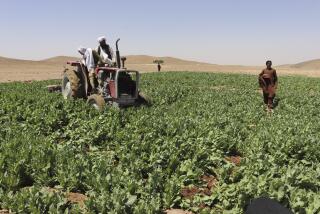Hands-on approach in Afghanistan
- Share via
The world’s leading source of illegal opiates is Afghanistan, which produces more than 90% of the world’s opium, the main ingredient in heroin, earning farmers and traffickers about $4 billion a year.
To fight the illegal crop, which has expanded in acreage each of the last six years, the Afghan government largely depends on a manual eradication program. Police officers guarded by soldiers go into the poppy fields and chop down the crops.
Despite pressure from the U.S. State Department and the presence of Ambassador William B. Wood, who played a key role in Plan Colombia as the U.S. envoy there before taking up his new post last year, the Afghans have rejected American offers to use aerial fumigation. President Hamid Karzai and other Afghan officials, along with some outside experts, have questioned the safety and effectiveness of the method.
More to Read
Sign up for Essential California
The most important California stories and recommendations in your inbox every morning.
You may occasionally receive promotional content from the Los Angeles Times.













